Buying a New Car Is a Bet on a Better Tomorrow
A car-shopping excursion is a reminder of why Americans are the world’s most resilient consumers.

Profit and prosper with the best of Kiplinger's advice on investing, taxes, retirement, personal finance and much more. Delivered daily. Enter your email in the box and click Sign Me Up.
You are now subscribed
Your newsletter sign-up was successful
Want to add more newsletters?

Delivered daily
Kiplinger Today
Profit and prosper with the best of Kiplinger's advice on investing, taxes, retirement, personal finance and much more delivered daily. Smart money moves start here.

Sent five days a week
Kiplinger A Step Ahead
Get practical help to make better financial decisions in your everyday life, from spending to savings on top deals.

Delivered daily
Kiplinger Closing Bell
Get today's biggest financial and investing headlines delivered to your inbox every day the U.S. stock market is open.

Sent twice a week
Kiplinger Adviser Intel
Financial pros across the country share best practices and fresh tactics to preserve and grow your wealth.

Delivered weekly
Kiplinger Tax Tips
Trim your federal and state tax bills with practical tax-planning and tax-cutting strategies.

Sent twice a week
Kiplinger Retirement Tips
Your twice-a-week guide to planning and enjoying a financially secure and richly rewarding retirement

Sent bimonthly.
Kiplinger Adviser Angle
Insights for advisers, wealth managers and other financial professionals.

Sent twice a week
Kiplinger Investing Weekly
Your twice-a-week roundup of promising stocks, funds, companies and industries you should consider, ones you should avoid, and why.

Sent weekly for six weeks
Kiplinger Invest for Retirement
Your step-by-step six-part series on how to invest for retirement, from devising a successful strategy to exactly which investments to choose.
The consumer is down, but not out.
That’s the message I got from a recent search for a new car. Cars represent a large share of economic growth this year, meager as it is. Based on solid sales gains in August and September, autos will be a bright spot in third-quarter GDP.
SEE ALSO: Car Sales to Remain Strong
From just $107.88 $24.99 for Kiplinger Personal Finance
Become a smarter, better informed investor. Subscribe from just $107.88 $24.99, plus get up to 4 Special Issues

Sign up for Kiplinger’s Free Newsletters
Profit and prosper with the best of expert advice on investing, taxes, retirement, personal finance and more - straight to your e-mail.
Profit and prosper with the best of expert advice - straight to your e-mail.
But that’s the view from 30,000 feet. My perspective, over the past few weekends, was at ground level. My car shopping tells me that the Great Recession hasn’t permanently changed something quintessentially American: More than any other people, we express ourselves -- who we are and especially who we want to be -- through what we buy. Nowhere is this more evident than in America’s love affair with the automobile.
Alas, I have never been in love with the automobile. It takes a lot to get me into a showroom. This time it was the embarrassing cloud of black smoke trailing my 2002 Camry, and the imminent arrival of kid number three.
Plus, I’m conservative, in the sense of cheap. Since the financial crisis, I’ve cut my debt and gotten even cheaper. No way was I buying anything but the most sensible of multiple-kid-transport vehicles. No frills.
At least, that’s how it started out for my wife and me. But I hadn’t been in the car-buying market for a long time, and I was in for two big surprises.
First, I was shocked at how little prices had changed. After rising an average of 3.2% a year from the 1940s through the 1990s, new car prices actually fell 3% from 2000 through 2010. This isn’t a side effect of the Great Recession: Car prices fell almost every year of the past decade, while overall, consumer prices rose 29%.
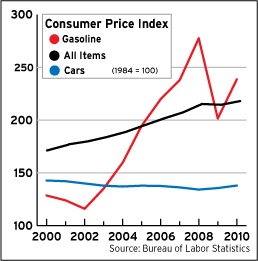
Quite a bargain, I thought. Did I feel a thaw in my cold, cheapskate's heart?
The second surprise: Cars are not only cheaper, they’re clearly better than ever. Initial quality, according to J.D. Power, has improved 27% for imports since 2000 and 34% for domestics (with domestics beating imports for the first time in 2010). The average age of cars has risen from 9.1 years in 2000 to 10.6 years, with most of that change coming before the downturn encouraged people to hold on to cars longer. And everyone knows that cars are more fuel efficient and less polluting.
But that doesn’t fully convey how much more new cars offer. Almost every aspect of the driving experience has improved. Seats are more comfortable. Cabin noise is lower. Instrument panels are better designed. Cars are safer, in large and small ways: Stronger frames are now a key selling point; side airbags are standard. Skid avoidance, impact warning systems and other innovations are becoming the norm. The list goes on.
Technology is behind a lot of this, as well as the price drop. Today’s cars contain more electronics than a PC, iPad and stereo combined. Moore’s Law, which predicts the speed of microprocessor advances, implies that prices for electronics fall about 30% a year. Cars get ever cheaper and smarter.
But that wasn’t the only thing my wife and I found appealing, as our car search gathered pace. Long before we bought a car -- before we had even visited dealerships -- both of us were spending a lot of time fantasizing about this purchase.
For Sarah, the car was freedom in a literal sense. As part of a one-car family, she had felt trapped when our youngest son was born in the bad winter of 2009-2010, and she dreaded a repeat. She hated relying on my smoke-belching Camry, with all the interior grime that comes from ferrying three slovenly males. We’re having a girl in January, and on some level, Sarah sees the two of them in that shiny new car, floating above the slush and chaos of family life.
I feel a little like that myself. Even though I’ll be driving the same old car, I’ll feel better knowing that the new one is there -- the option, perhaps, of a brief escape. My fantasy was more about safety. I became fixated on finding the car that would best protect my brood, sparing no expense. I suppose it’s one way of dealing with the pressure of greater responsibility.
By the end, we were both giddy with expectation, and ended up buying a car that justified this feeling. It’s practical, but with every cool accessory imaginable: I’m embarrassed to say how much time I’ve spent gawking at the video camera in the rearview mirror.
We spent more than I ever would have imagined and took on more debt, yet we’re thrilled. My unscientific research tells me this is typical. Americans see the automobile as something that will carry them where they want go -- it makes them who they want to be. In our case, we’d like to be a little less overwhelmed with parenthood and not as worried about the future.
We’re surely not the only ones trying to redefine ourselves by buying a new car. Sales will reach 13 million this year, more than halfway back to prerecession levels. And it’s not just in cars that Americans see the reflection of what they want to be. Apple products are cool and smart, but the reason Steve Jobs’ passing seemed like such a personal loss to so many people is that owning his wonderful inventions made us feel cooler and smarter.
It helps, of course, that today’s low interest rates make buying cars and other things so easy. If you think about it, borrowing is really a bet on a better future. For a couple of hundred bucks a year in interest, you can make that optimistic bet and drive it around.
And that’s why I think the recent lull in consumer spending won’t last. Even those hit hard by the economy are dreaming of a better day and the things that seem to make it possible.
Profit and prosper with the best of Kiplinger's advice on investing, taxes, retirement, personal finance and much more. Delivered daily. Enter your email in the box and click Sign Me Up.

-
 Betting on Super Bowl 2026? New IRS Tax Changes Could Cost You
Betting on Super Bowl 2026? New IRS Tax Changes Could Cost YouTaxable Income When Super Bowl LX hype fades, some fans may be surprised to learn that sports betting tax rules have shifted.
-
 How Much It Costs to Host a Super Bowl Party in 2026
How Much It Costs to Host a Super Bowl Party in 2026Hosting a Super Bowl party in 2026 could cost you. Here's a breakdown of food, drink and entertainment costs — plus ways to save.
-
 3 Reasons to Use a 5-Year CD As You Approach Retirement
3 Reasons to Use a 5-Year CD As You Approach RetirementA five-year CD can help you reach other milestones as you approach retirement.
-
 10 Things You Should Know About Buying a Car Today, Even if You've Bought Before
10 Things You Should Know About Buying a Car Today, Even if You've Bought BeforeIf buying a car is on your to-do list, and it's been a while since you went shopping for a new one, this guide will help avoid any nasty shocks in the showroom.
-
 Get the Best Car Deal in Retirement: Here's the Trick
Get the Best Car Deal in Retirement: Here's the TrickPlanning on shopping for a new car this Labor Day weekend? Here’s how to haggle for a better price, even though you're retired.
-
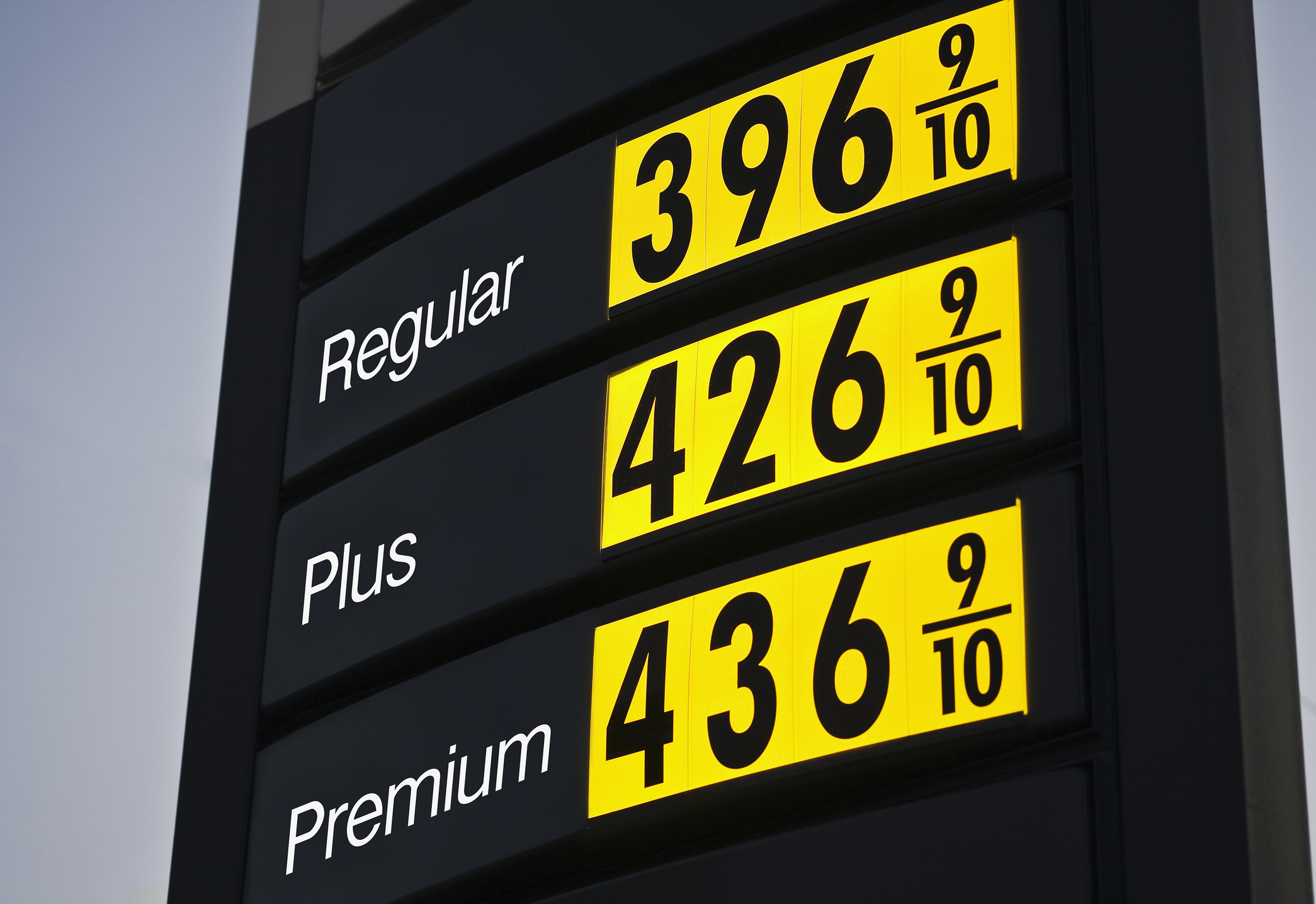 7 Gas-Saving Tips That Actually Work
7 Gas-Saving Tips That Actually WorkThese are gas-saving tips that will actually work for you and your car this year.
-
 Want to Lease an EV? The Tax Credit 'Loophole' for That Is Going Away Soon
Want to Lease an EV? The Tax Credit 'Loophole' for That Is Going Away SoonTax Credits If you are deciding whether to lease or buy an electric vehicle, here is what you need to know about how the EV lease tax credit works now that it will be eliminated under Trump's new tax law.
-
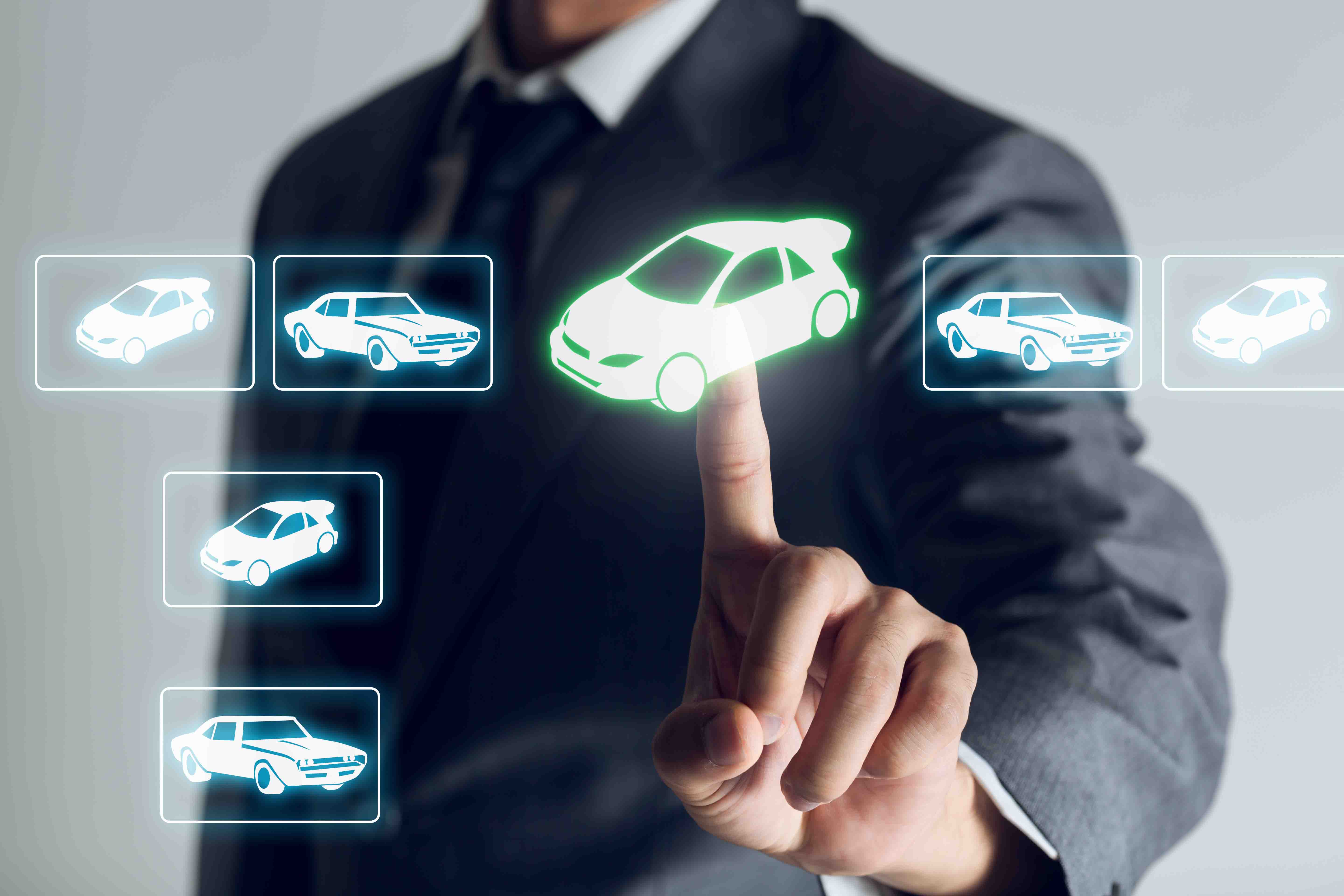 Car Buying in a Topsy-Turvy Market
Car Buying in a Topsy-Turvy MarketYou need a new car? Good luck with that! What should you do? We've got some answers.
-
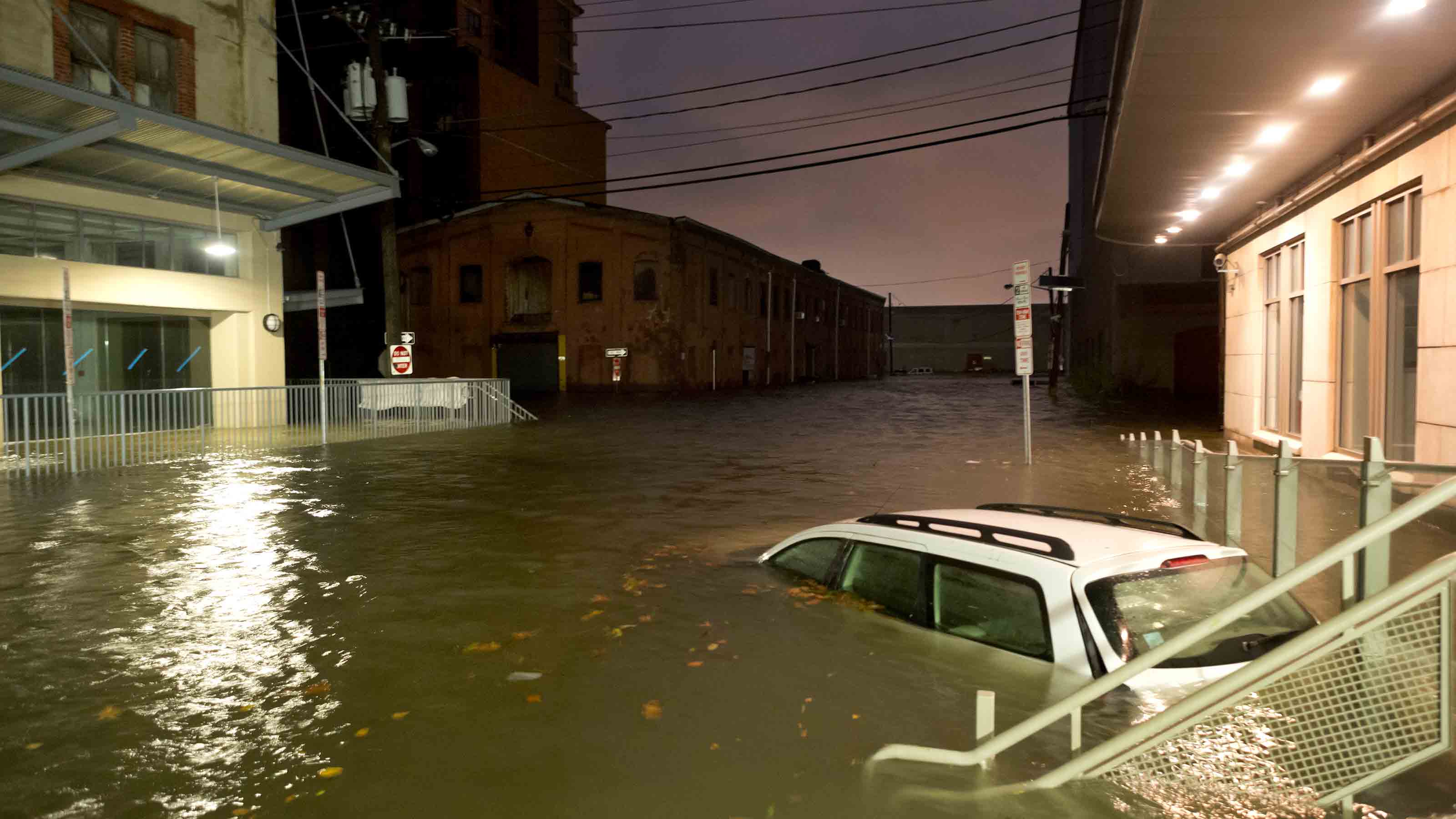 Watch Out for Flood-Damaged Cars from Hurricane Ian
Watch Out for Flood-Damaged Cars from Hurricane IanBuying & Leasing a Car In the wake of Hurricane Ian, more flood-damaged cars may hit the market. Car prices may rise further because of increased demand as well.
-
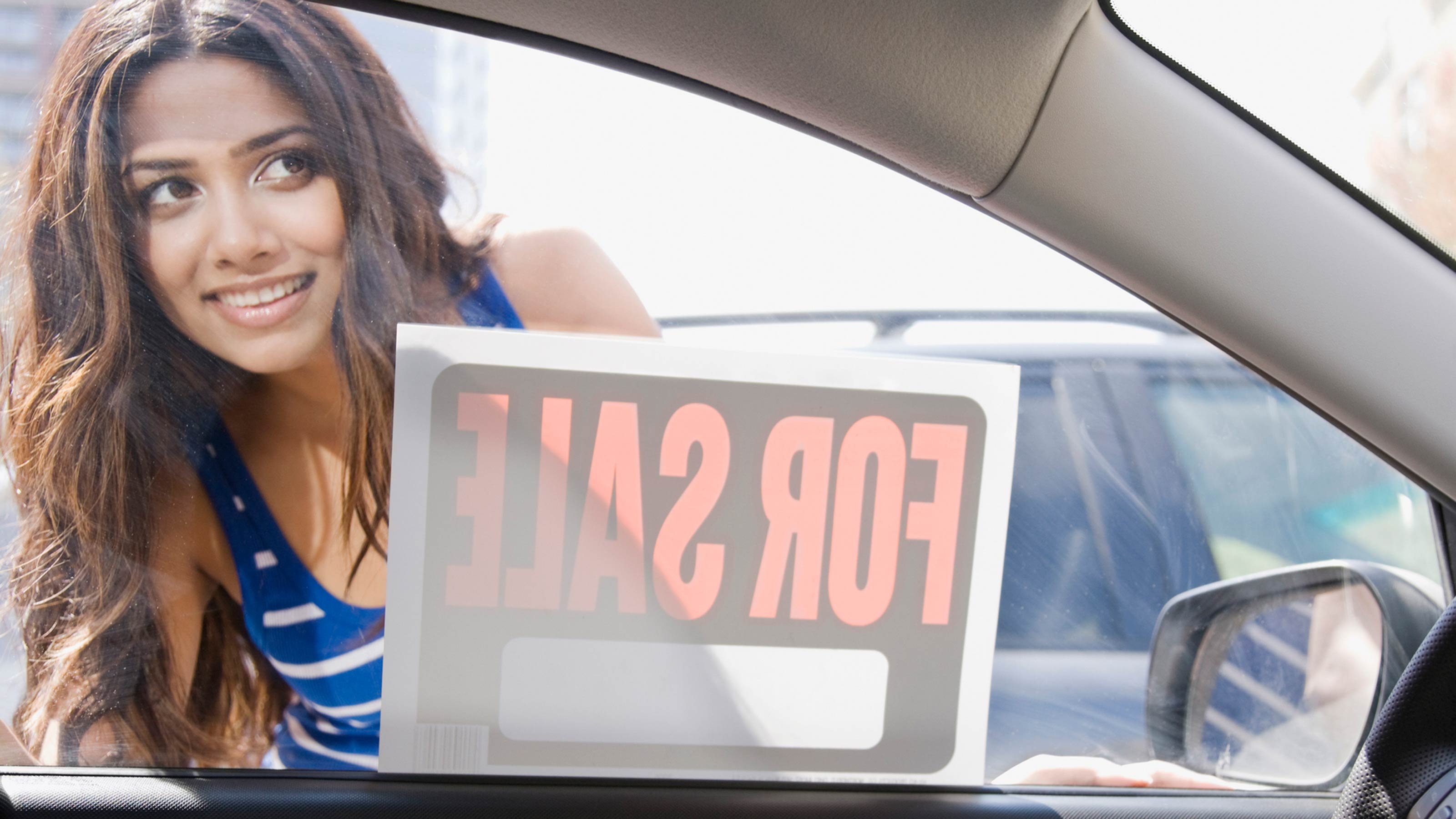 Car Buyers: The 3-Day Grace Period Is Just a Myth!
Car Buyers: The 3-Day Grace Period Is Just a Myth!Buying & Leasing a Car Many car buyers think they have three days after making a purchase to return a car. Here’s where they’re going wrong, and what they should do instead to get a decent used car.
-
 PODCAST: Car-Buying in an Inflated Market with Jenni Newman
PODCAST: Car-Buying in an Inflated Market with Jenni NewmanBuying & Leasing a Car With cars both scarce and expensive these days, what to do if you want – or need – a new ride? Car-buying strategist Jenni Newman of Cars.com shares some tips. Also, more on the magical 9% savings bond.